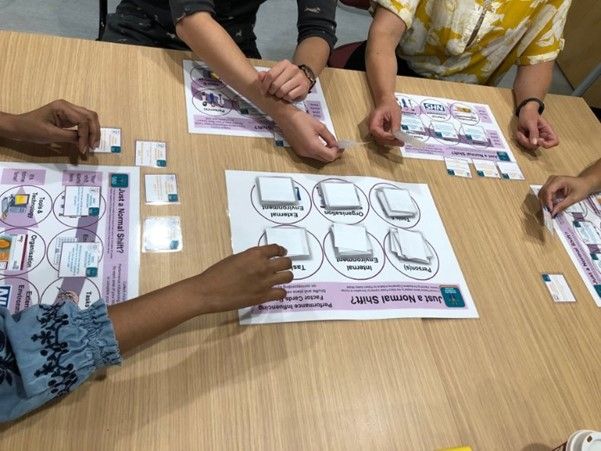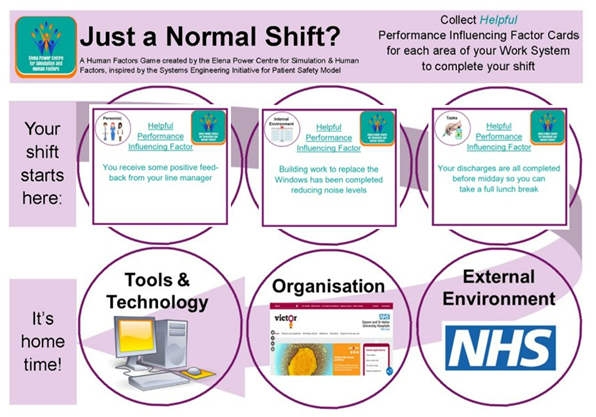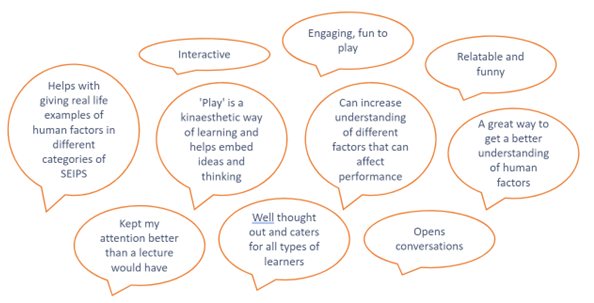
Ruth Millett, Senior Simulation Practitioner/Centre Manager, Elena Power Centre for Simulation and Human Factors, Epsom and St Helier NHS Trust
The Elena Power Centre for Simulation and Human Factors at Epsom and St Helier University Hospitals NHS Trust is a human-factors focused simulation centre. Here we describe the development of a game designed to promote an understanding of human factors in healthcare for professionals.
To orientate all our simulation course participants to an understanding of human factors, we begin all our simulation courses with a human factors workshop. To ensure that this understanding is systems-based rather than person centred, the Systems Engineering Initiative for Patient Safety (SEIPS) model is first explained [1]. This aligns with the NHS current approach to patient safety which utilises the SEIPS model. Course participants then engage in interprofessional group work where they discuss systems-based impacts on their work. This workshop enables course participants to engage more confidently in post scenario debriefs where they are encouraged to go beyond reflecting on scenarios, but to also relate human factors themes to their everyday work. Consequently they can suggest potential system level changes to clinical practice, intended to improve performance and wellbeing outcomes.
However, over time, we noticed that some simulation course participants, particularly those with less experience, struggle to identify and discuss human factor themes which impact on them in their workplace. In addition, those attending uniprofessional simulation courses struggle to take account of the perspectives of other professionals in their discussions. For this reason, we wanted to develop an innovative teaching aid, in the form of a table-top game, which would promote participant understanding and engagement.
The game we designed is based on the SEIPS work system. We worked with interprofessional colleagues to identify factors that help and hinder processes in the work system and categorised them under the SEIPS headings ‘Person’, ‘Organisation’, ‘Internal Environment’, ‘Tasks’, ‘Tools and Technology’ and ‘External Environment’. We then made a series of ‘Helpful’ and ‘Unhelpful’ ‘Performance Influencing Factor’ cards. To win the game, course participants need to be the first person to collect a ‘helpful’ card for each SEIPS heading on their game board.

We piloted ‘Just a Normal Shift’ by playing the game with interprofessional faculty, and course participants, including those with specialist expertise in human factors in healthcare. We then conducted a survey to obtain feedback.


Having obtained positive feedback, we integrated the ‘Just a Normal Shift’ game in our Foundation Simulation Day and Medical Student Simulation Programme. We have also played the game in-situ with interprofessional teams in the trust. The game has been successful in prompting discussion and shared learning about the actual or hypothetical impact of performance influencing factors in real-life and we continue to have positive responses from course participants.
At ASPiH 2023, the ‘Just a Normal Shift’ game was both presented as an oral presentation [2], as well as showcased during a workshop. As a result of the interest generated, we have shared the game with various NHS and higher education organisations to be integrated into their teaching. Our plan is now to develop expansion packs of ‘Performance Influencing Factor Cards’ for obstetric, paediatric and community specialties so that professionals in these areas can benefit.
If you would like to know more about the game or would like to obtain a copy, please email esth.simulation@nhs.net
References:
- Carayon P, Schoofs Hundt A, Karsh BT, Gurses AP, Alvarado CJ, Smith M, Flatley Brennan P. (2006) Work system design for patient safety: the SEIPS model. Qual Saf Health Care. 15 Suppl 1: i50-8.
- Millett R, van Vuren E, Wadsworth J, Blair J. (2023) The SEIPS game: An interprofessional teaching aid to promote understanding of human factors in healthcare. Int Journal of Healthcare Simulation. 3 Suppl 1: A35.